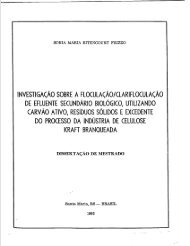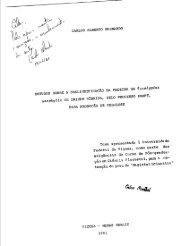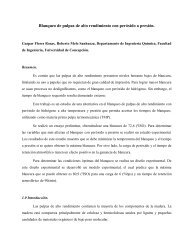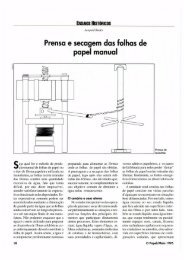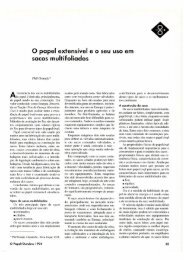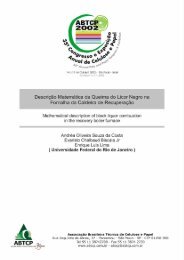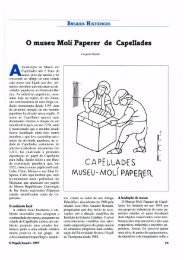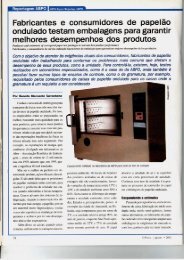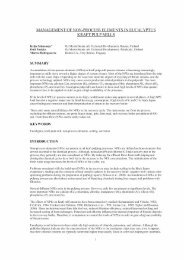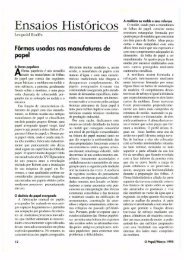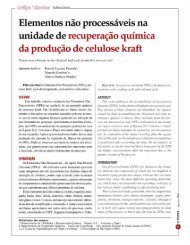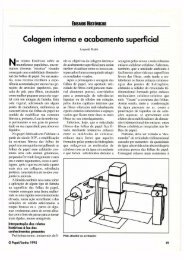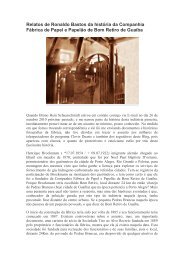O Eucalipto: um século no Brasil (The Eucalypt - Celso Foelkel
O Eucalipto: um século no Brasil (The Eucalypt - Celso Foelkel
O Eucalipto: um século no Brasil (The Eucalypt - Celso Foelkel
You also want an ePaper? Increase the reach of your titles
YUMPU automatically turns print PDFs into web optimized ePapers that Google loves.
A demanda era tão forte, que em 240 a<strong>no</strong>s os portugueses acabaram com todas as árvores da<br />
Ilha da Madeira, mas aos ingleses bastaram 20 a<strong>no</strong>s para eliminar a última árvore da ilha de<br />
Barbados. E <strong>no</strong> <strong>Brasil</strong>, os engenhos de açúcar, 70 em Pernambuco e 40 na Bahia, <strong>no</strong> <strong>século</strong><br />
XVI, afetaram a Mata Atlântica de tal modo, que hoje restam só 8% dessa floresta.<br />
Muito antes, entretanto, em 1760, D. José I, rei de Portugal, baixa o alvará que é considerado<br />
a primeira lei ecológica relativa ao <strong>Brasil</strong>. El Rey tinha sido informado de que “os povos<br />
das referidas capitanias cortam e arrasam as árvores chamadas mangues, a fim de<br />
as venderem como lenha”, e proíbe tal atividade, por temer que os mangues deixassem<br />
de existir, o que não podia ocorrer, já que essas árvores eram as únicas, acreditava, que<br />
forneciam tani<strong>no</strong> para os curt<strong>um</strong>es.<br />
No Hemisfério Norte, a derrubada dos pinheirais foi tão grande, que os inspetores da Nova<br />
Inglaterra previram já em 1719 o fim das florestas nativas.<br />
No <strong>século</strong> XIX, quando o homem começou a vencer as doenças infecciosas e,<br />
em conseqüência, multiplicou por várias vezes a população sobre o planeta, aguçou ainda<br />
mais o apetite por madeira. A demanda cresceu intensamente, inclusive <strong>no</strong> <strong>Brasil</strong>, com o<br />
advento das ferrovias, a primeira de 1830, na Inglaterra, cons<strong>um</strong>indo madeira nas fornalhas<br />
das locomotivas, nas pontes, <strong>no</strong>s túneis, nas estações e <strong>no</strong>s dormentes.<br />
O E U C A L I P T O - U M S É C U L O N O B R A S I L<br />
52<br />
Locomotiva Barão de Souza Queiroz.<br />
A exigência de lenha das marias-f<strong>um</strong>aça resultou <strong>no</strong>s primeiros plantios de eucalipto <strong>no</strong> <strong>Brasil</strong>.<br />
<strong>The</strong> demand of steam trains resulted in the first plantations of eucalypts in Brazil.<br />
<strong>The</strong>re was so much demand that in 240 years the Portuguese depleted all of the trees<br />
in the Madeira Islands. <strong>The</strong> English, meanwhile, needed only 20 years to eliminate the<br />
last tree on Barbados. In Brazil, the sugar mills, 70 in Pernambuco and 40 in Bahia, in<br />
the 16 th century, affected the Atlantic Forest in such a manner that today only 8% of this<br />
forest remains.<br />
Well before, however, in 1760, D. José I, the King of Portugal, signed the permit which<br />
is considered the first ecological law related to Brazil. El Rey had been informed that<br />
“the peoples of the mentioned captainships cut and drag the so-called marsh trees to<br />
sell them for firewood”, and prohibits the activity, fearing the marshes would disappear,<br />
something that couldn’t happen since it was believed those were the only trees that<br />
provided tannin to the tanning.<br />
In the Northern Hemisphere, pine tree slashing was so intense that New England inspectors<br />
foresaw native forests would disappear completely by 1719.<br />
In the 19th century, when mankind started defeating infectious disease and multiplied<br />
its population on the planet many times over, the appetite for wood became even more<br />
voracious. Demand grew even more, even in Brazil, with the advent of the railways, the<br />
first, in 1830, in England, cons<strong>um</strong>ing wood in the engines, to build bridges, in tunnels,<br />
in stations and in the sleepers.




